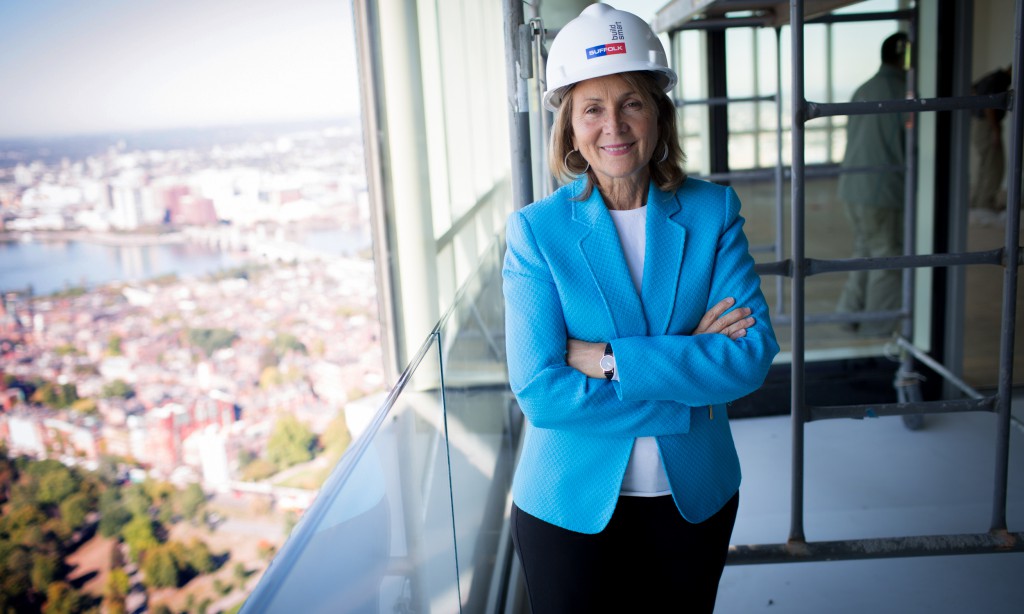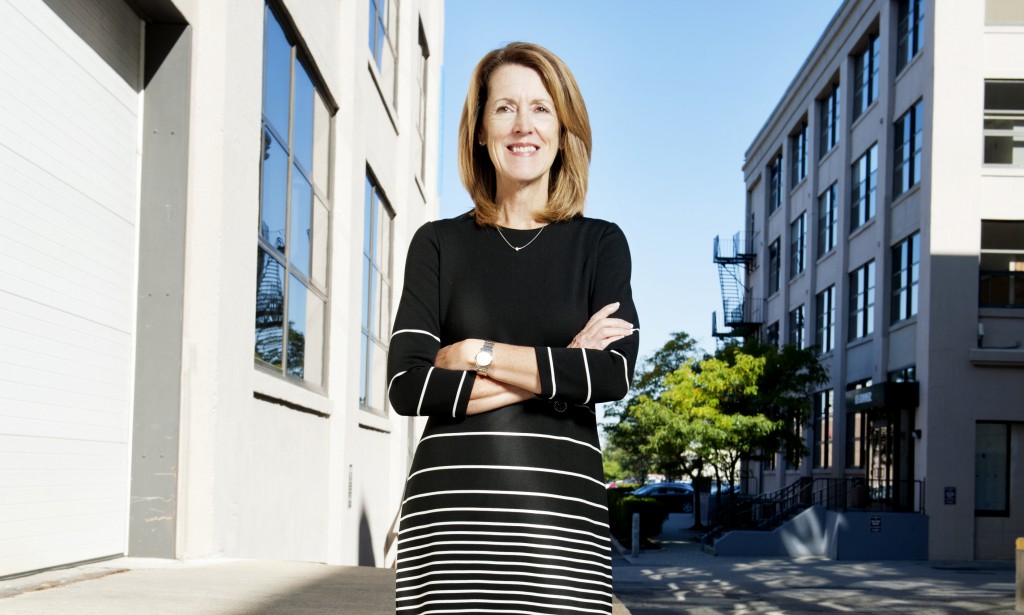“You need to perform for the people who believe in you.” -JUDITH HILTON
By Kristen Walsh
Judith Hilton, AET ’93, AEC ’95, Kathleen (Carignan) MacNeil, AE ’83, and Colleen Moore, MSCM
’13, have earned recognition as successful women leaders in the male-dominated industries of commercial real estate brokerage, development, and construction management, respectively. But when it comes to the grit behind their success, it’s not based on gender; it’s based on seizing opportunities, tackling challenges, and refusing to accept gender as a barrier.
“I look forward to the day when we can just talk about being exceptional leaders and contributors
instead of focusing on being female,” says Hilton, chief operating officer of Cresa, a commercial real estate brokerage firm representing tenants.
And there’s a lot to talk about when it comes to Hilton’s climb to the top. It started early in her career, when a manager at Parametric Technology Corporation offered her a job as project manager for field office projects throughout the U.S. and Canada. A promotion just four months later landed her in charge of the company’s domestic portfolio.
“That’s the yin and yang of being presented with opportunity,” says Hilton, who admits that both moves involved a learning curve and on-the-job training. “You need to be willing to work hard to demonstrate that you’re worthy of it. You need to perform for the people who believe in you.”
For Moore, opportunity was packaged very differently: via the economic downturn of 2008. After being laid off from a major general contractor, Moore took a leap of faith and launched City Point Partners LLC, a construction services firm.
“There was high unemployment, so I was able to hire a skilled team, but there was also public funding available for shovel-ready projects,” she recalls of building a strong client base of public utility infrastructure projects. “It was the perfect storm.”

“I very seldom think of my gender, but I do think about the diversity different people bring through their background and knowledge.” -KATHLEEN MACNEIL
A perfect storm, though, often comes with some level of uncertainty. MacNeil, for example, initially had misgivings about transitioning from the contractor to the developer side when she was offered a job at Macomber Development Associates in 1988.
“I knew that development could be a tough business,” says MacNeil, who is now a principal for MDA Partners LLC, a joint venture of Millennium Partners and MDA. “But at the same time I knew that I had a great opportunity because my passion was in creating spaces where people could gather. Developers have the vision and are willing to take a risk to create unique places where people can work and
play.”
Boston’s skyline is showing that MacNeil made the right choice. Major projects include Millennium Tower at Downtown Crossing.
This recently completed high rise (680’) is a luxury residential project containing 442 units with Pabu restaurant, Old Navy, and Primark on the lower floors.
No matter the project, MacNeil’s inspiration comes from seeing how a building interacts with its environment: “I love the activity of people shopping, using office space, sitting in a coffee shop. It’s exciting to be a part of putting that together.”
Up for the Challenge
When Moore founded City Point, she set out to formalize the skill set she had gained from years in the field.
“I had experience in facilities and back-end services, but I knew that completing a master’s program in construction management at Wentworth would provide further confidence
for my clients,” says Moore, who serves as president of City Point.
As a woman-owned small business, City Point got its start with public agencies. More recent projects include a building renovation for the Rising Tide charter school in Plymouth and ground-up construction of a new facility for Massachusetts Department of Transportation’s central materials and research lab (moving from Boston to Hopkinton). At the end of the day, however, it’s not about the company’s woman-owned status.
“Growth depends on your team’s ability to do quality work and get called back. That what makes you successful.”
Hilton was a project manager at Cresa and had just received an MBA when the company’s CEO approached her to fill a newly created position of director of operations in 2003. She didn’t balk at the chance to move from the client side to management.
“When you’re running a company’s operations, everything you do is a project, moving the company from Point A to Point B. I knew that I could apply those project management fundamentals to strategic planning.”
Still, she fondly recalls a vote of confidence from a Wentworth professor who had stayed in touch. “When I first took on the operations role, the professor encouraged me to believe that I deserved to “pull up a chair in the board room” because I “belonged at the table.” And he was absolutely right.”

“Growth depends on your team’s ability to do quality work and get called back. That what makes you successful.” -COLLEEN MOORE
Moore has made a commitment to provide that same kind of support to those she manages.
Throughout her career, she has created cultures of mutual respect by giving employees a seat at the table. “Regardless of someone’s title, I invite them to facilitate meetings. You learn how to lead by taking small steps to build confidence and boost your ability to interact in front of your peers.”
That kind of “getting comfortable with the uncomfortable” was something that MacNeil perfected in male-dominated Wentworth classes.
“I learned how to collaborate with male students on group projects, so working alongside men in the workplace has never felt strange,” says MacNeil, who got her start at a Wentworth co-op working for a construction firm. “I very seldom think of my gender, but I do think about the diversity different
people bring through their background and knowledge. Being a developer is about bringing a team of people together to work toward a common goal.”
For Hilton, collaboration is operational: keeping people connected throughout the organization. Though much of her early field work was outside of Boston—as far as Europe, the Middle East, and Africa on projects for EMC Corporation—she is a key player in building Cresa’s headquarters in Boston.
The company’s local office works with clients leasing spaces in both the downtown and suburban markets throughout eastern Massachusetts.
As for being a powerful woman in her field, Hilton doesn’t take much notice. “What has enabled my success more than anything is being authentic and gaining trust.
Leadership is not about telling people where you’re going, it’s about knowing where you’re going and bringing everyone on the journey.”



2 Comments
For many years, the Massachusetts Society of Professional Engineers was based on the Wentworth campus. It was a very exciting time to be there, as the Institute was moving from skilled trade training to training in engineering technology – and on into engineering. We watched the campus grow in so many ways, Young men were raising their professional horizons, and young women were beginning to join them. Aspiring engineers from around the world enrolled, and it was delightful to watch Huntington Ave. turn into a vibrant community that welcomed the best from everywhere. Congratulations to all of you. And thanks for a wealth of really great associations with so many gifted young people.
Thank you very much for your thoughtful comment! We have also taken great pride in the way our campus and the surrounding Boston area have grown. We foresee great things for the future and will certainly keep you updated with any news!